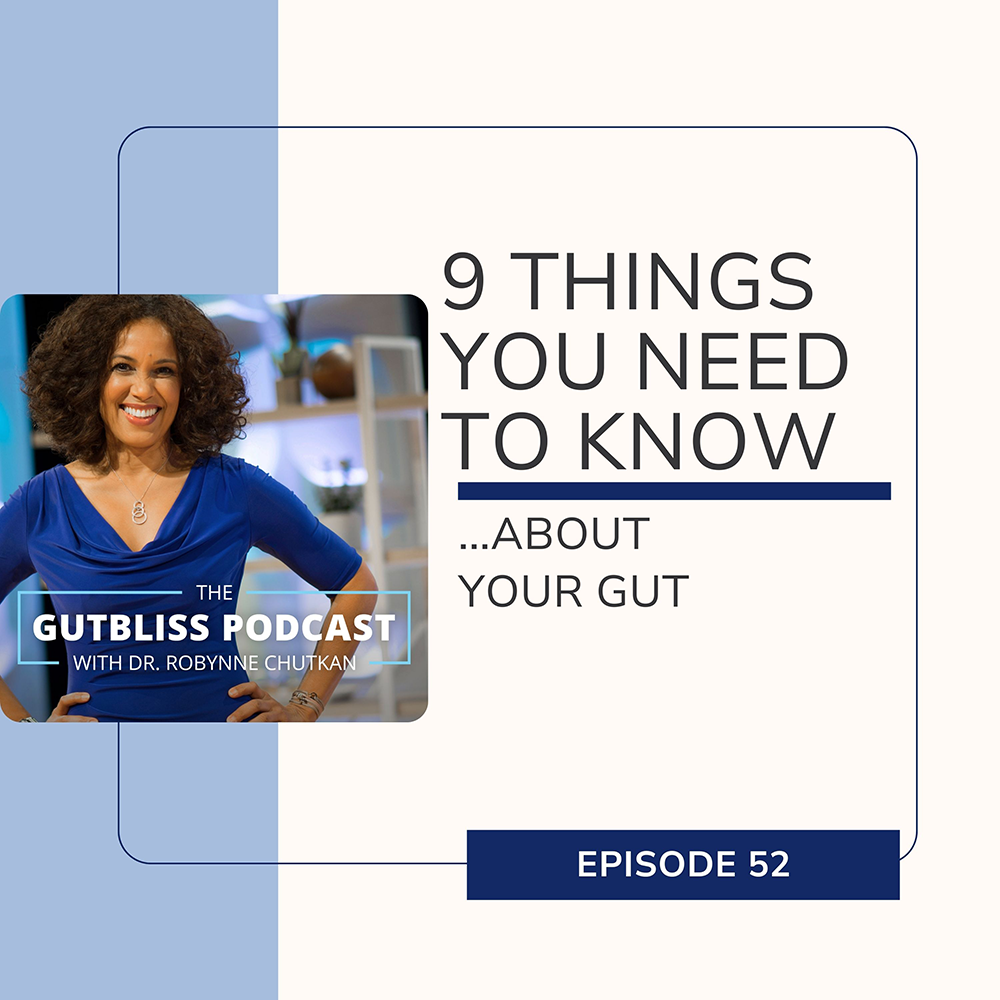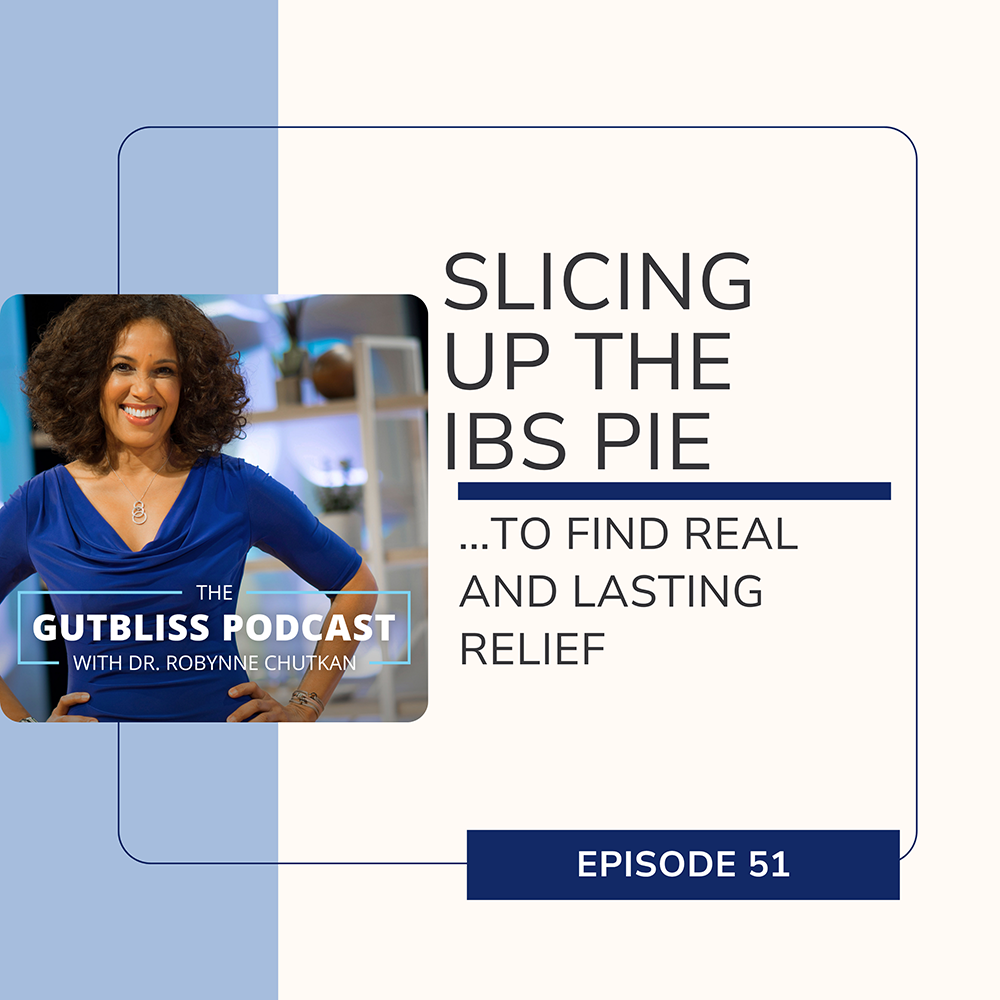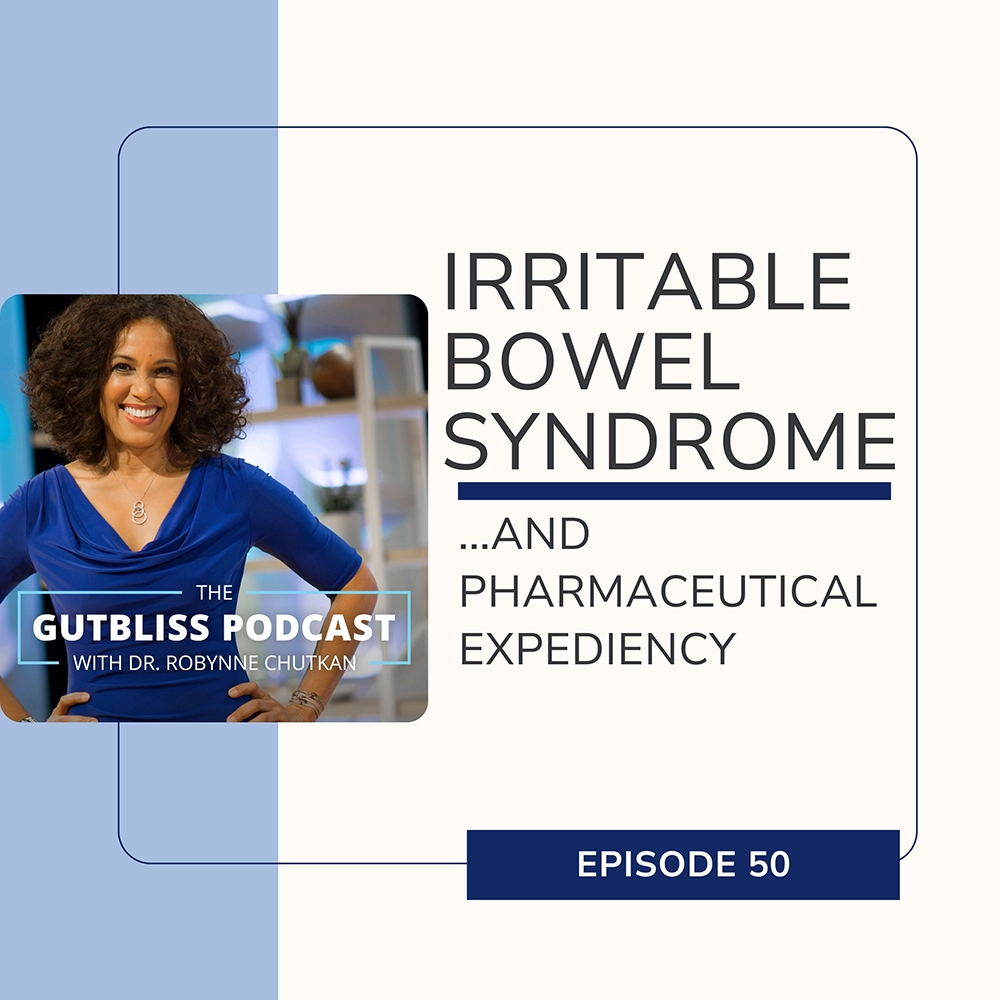More than 60 million Americans experience heartburn on a regular basis, but the recommended treatment does nothing to address the root cause – and totally messes up your digestion. The most important thing that I want you to know is that acid reflux has absolutely nothing to do with overproduction of acid. These symptoms are caused by inappropriate opening of the lower esophageal sphincter, and on today’s show, I’m going to tell you about the three most common factors that cause that lower esophageal sphincter to open, and how to treat them without blocking stomach acid.
Thank you for being a part of our community! For the latest in digestive wellness go to https://gutbliss.com/ and follow us on Instagram for more gut health info.
More than 60 million Americans experience heartburn on a regular basis, but the recommended treatment does nothing to address the root cause – and totally messes up your digestion. I’m Dr. Robynne Chutkan, gastroenterologist, microbiome expert and author, and I am here to help you find gutbliss.
On today’s show, we are talking about acid reflux, one of the commonest conditions that we see as gastroenterologists. The first thing – and the most important thing – that I want you to know is that acid reflux has absolutely nothing to do with overproduction of acid. Literally 99.99% of people with reflux have completely normal acid levels. Overproduction of acid is a super rare disease called Zollinger-Ellison syndrome. We call it ZE for short. And ZE affects literally about one in a million people. So there are maybe three or 400 people in the United States walking around with actual overproduction of acid.
Well, what’s going on in the other 60 million people who are experiencing heartburn on a regular basis? If acid reflux and heartburn symptoms are not caused by overproduction of acid, then what causes it? These symptoms are caused by inappropriate opening of something called the lower esophageal sphincter or LES for short. This is a little valve at the bottom of the esophagus that holds the contents of the stomach in place and prevents them from rising up into the esophagus causing heartburn. So you have two sphincters in your esophagus. You have the upper esophageal sphincter, the UES, and the lower esophageal sphincter, the LES. When the UES opens, it allows the contents of your mouth to enter into the esophagus, and then those contents travel through these wave-like motions in the esophagus down to the bottom of the esophagus. And then the lower esophageal sphincter opens up and it allows those contents to enter your stomach. Now, once the food or drink has passed from your esophagus into your stomach, the LES, that lower sphincter, shuts tight to prevent stuff from coming back up into the esophagus in the opposite direction from the way things are supposed to go. When we come back, I’m going to tell you what the three most common factors are that cause that lower esophageal sphincter to open inappropriately and give you heartburn and acid reflux when we come back.
The Gutbliss Podcast is brought to you by Visbiome, my first and quite frankly my only choice for a probiotic. Whether you’re dealing with irritable bowel syndrome or just looking to restore your gut health, Visbiome can help. It’s a medical food for the dietary management of IBS and gut inflammation. Backed by science and clinically vetted by thousands of my own patients. Find your gut bliss with Visbiome. Go to visbiome.com/gutbliss and use discount code GUTBLISS at checkout.
The three most important causes of heartburn and acid reflux are number one, overfilling your stomach with too much food. Number two, eating or drinking the wrong food. And number three, eating too late. And I’m gonna go over each one of those.
So let’s start with the first one, overfilling your stomach. Your stomach is actually about the size of your fist. If you make a fist and take a look at it, that’s what your stomach looks like when it’s collapsed. When it is full, if you open up your fist and kind of make a ball, that’s about the size of a full stomach. But most of us are eating way more than a fistful of food. And we’re particularly eating the food at the wrong time. That was factor number three, I’m gonna come back to that. So overfilling the stomach is a major cause of reflux because when the stomach is filled beyond its natural capacity, what happens? It pops that lower esophageal sphincter open and the contents in your stomach start to go up in the wrong direction, back up into the esophagus and that causes reflux. So a mechanical issue of just too much stuff in the stomach is one of the major causes of reflux.
Number two, eating or drinking the wrong food. And there are four big categories here. High fat foods, alcohol, caffeine, and I’m so sorry about the last one, but yes, chocolate. So let’s talk about each one of these things. High fat food is a problem because fat is harder to digest. It’s much more complex than digesting, for example, a carbohydrate. So there are some sensors in your stomach, and these are chemical receptors, and when they sense that you have eaten something with a high fat content, they send a message to something called the gastric pacemaker. It’s this bundle of nerves in the stomach that control how quickly the stomach contracts. And they say to the gastric pacemaker, slow it down, we’ve got a lot of fat here on board and we’re gonna need extra time. And so your stomach contracts a lot more slowly. Why is that a problem? Because it takes longer for the stomach to empty. Remember, the whole goal of digestion is to move things from your mouth to your anus. So it’s in a downward direction. When you eat a high-fat meal, the contents are sitting in your stomach and the stomach is contracting slowly. And there’s more opportunity for that full stomach, again, to pop open that lower esophageal sphincter and the contents to start moving up into the esophagus just because the stomach is so full and it’s contracting so slowly. So high-fat foods slow down stomach emptying and that predisposes you to reflux. And that’s why when you eat a high-fat meal or food that’s high in fat, you feel full much faster. You’re gonna feel full faster eating nuts or avocado or a steak compared to something that is primarily carbohydrate, like a piece of fruit. So high-fat foods can trigger reflux, particularly if you were eating them at the wrong time. That’s factor number three that I’m gonna get back to. Okay, second one, alcohol. Alcoholopens up that lower esophageal sphincter and very simply that is going to cause acid reflux because again, when the lower esophageal sphincter opens, contents in the stomach are gonna come up into the esophagus. Caffeine does the same thing. It works on that lower esophageal sphincter chemically and there’s some medications that have a caffeine-like effect, some asthma medications, etc. So caffeine also chemically opens up that lower esophageal sphincter and chocolate does the same thing. I’m so sorry. And yes, dark chocolate does it too. But what I also want to mention about alcohol is that that also is very caustic to the stomach lining. So not only is it potentially opening up the lower esophageal sphincter, but it’s also creating something called gastritis, inflammation of the stomach, and it can do the same thing in the esophagus. So alcohol has some additional deleterious effects in your GI tract beyond just the reflux.
Okay, factor number three, and this is a huge one, and that is eating too late. Your stomach actually has a bedtime. The contractility of your GI tract, and particularly your stomach, is tied to the circadian rhythm, the light-dark cycle, which means that it’s very active in the morning when the sun is up and throughout the day, and then when the sun sets, it basically goes to bed. It’s much less active. Unfortunately, most of us are eating the majority of our calories after the sun has set, and that is a major problem. When I get my patients to calorie shift – it’s the old adage, eat breakfast like a queen, lunch like a princess, and dinner like a pauper (or some other sort of Disney-esque analogy). But the point is, if you eat your largest meal earlier in the day, you don’t have to eat it at breakfast, but let’s say you eat it at lunchtime. Let’s say you even eat it at three or four o’clock instead of seven or eight p.m. Eating it earlier is going to make a huge difference because your stomach and your entire GI tract is much more active. And so it’s gonna be much easier to digest. Plus, you typically are still upright earlier in the day. And so you have the benefit of gravity to help things get from north to south, as opposed to you’re eating dinner at eight o’clock and then you are reclining on the couch and now things are just sitting in your stomach. So eating too late because of that circadian rhythm, contractility and because of gravity – major cause of acid reflux. So it’s really quite remarkable that if you eat the same stuff, but eat it earlier, you are likely to see a significant improvement in your symptoms. Now, if you eat earlier and you cut down on the fat content, the alcohol, the caffeine and chocolate, you are really gonna see a difference. And if you do those two things and you eat a slightly smaller portion, that’s when the magic happens.
Okay, now I want to turn to why the current standard of care for reflux is a terrible idea, why it is literally – and I am not overstating this, I promise I’m not exaggerating – it is devastating for digestion. Acid blockers are some of the most popular drugs on the planet. And I’m talking about the drugs known as PPIs, proton pump inhibitors, primarily here, not talking about antacids. Why are they so popular? Because they are really good at what they do. I believe at one point they were the third or fourth most commonly prescribed drugs in the world. They’ve been replaced by erectile dysfunction drugs and some others, but they are still very widely used. And again, they’re really good at what they do. And what they do is they block stomach acid completely. They literally shut off that proton pump. That is a pump that makes acid in the stomach. And so you can eat and drink with gay abandon, and typically you’re not going to get the heartburn symptoms, but you are still getting the damage. Now the sphincter is still opening, that lower esophageal sphincter, and the contents from your stomach are still coming up, but they’re just less acidic. And here is the problem. The lining of the esophagus is made up of completely different cells from the lining of the stomach because they have different functions and they’re exposed to different things. So the lining of the esophagus are squamous cells and in the stomach, they’re columnar cells. The stomach columnar cells are designed to withstand acid, but the squamous cells in the esophagus are not. And even when you have completely blocked your stomach acid, so what’s coming up is not a lot of acid, but it is still this partially digested food, that is still damaging to the lining of the esophagus. That stuff is not supposed to be in the esophagus.
So there are many reasons why blocking stomach acid is such a bad idea, but one of the most important ones is that stomach acid is simply the essential ingredient for digestion. So when you don’t have stomach acid, you really mess up digestion and you mess up absorption of nutrients. What do I mean you mess up digestion? Let me give you an example. Different organs in the GI tract, like your pancreas and your gallbladder and your liver, secrete enzymes. And those enzymes are involved in breaking up the food, in breaking up the carbohydrate, the protein, the fat, etc. Those enzymes require an acidic pH to work properly. So when you’re taking a PPI and you’ve blocked your stomach acid, guess what? Your stomach is no longer acidic. It is now alkali and those enzymes are not going to work properly. The food is not going to be properly broken down and the nutrients are not going to be properly absorbed. One of the other things that stomach acid does, it is one of our most potent defenses against pathogens. For example, SARS-CoV-2: stomach acid unravels the viral protein and inactivates the virus. So when you don’t have stomach acid, you are at a much higher risk for viral infections, bacterial infections, and even some parasitic infections because you are removing one of your body’s most potent defenses against pathogens. And that also ends up messing up your microbiome and you can get things like small intestinal bacterial overgrowth because our digestive tract is designed with purpose. And part of that purpose is acid up top in the stomach, and alkaline down below in the colon. When you now make the stomach alkali, what happens is that you have overgrowth of bacteria, not just the pathogens I mentioned, but even regular species are not kept in check. And so you mess up that microbial balance. I literally could do a whole episode on the importance of stomach acid, but I will spare you. And when we come back, three simple steps to cure your reflux symptoms without drugs.
The first step we already talked about, and that’s the calorie shifting, eating the largest meal earlier in the day. Give your stomach a bedtime, set a curfew, no eating or drinking after dark is generally the simplest way to do that. Second thing I want you to do is I want you to be conscious of the fat content of your food, and I want you to decrease the fat content. You don’t have to eliminate it, please don’t do that, but decrease it, particularly at night, and increase the fiber. What does that actually look like? If you’re out for dinner and you decide you’re going to have a steak, first of all, try and go earlier. Eat like old people at five o’clock if you can. But even if that’s not possible, think about having a smaller portion. Maybe you cut that steak in half and you take half home and order more fiber. So have a salad plus have a side vegetable and less steak. Maybe eat the steak for lunch the next day, or you think about having something that’s lower in fat. So maybe you have a salad with a little bit of steak, a steak salad, instead of a steak and salad. So be conscious of the fat and fiber content of your food, smaller portions. And again, I want you to be careful with alcohol and caffeine and particularly when you’re having it. So I’m not suggesting that you start day drinking, but alcohol within a couple hours of bedtime is really going to be a problem because again, your stomach is likely fuller from dinner and it’s also less active because the sun has set. So ideally, you want to be not having alcohol within about three hours of bedtime. And all the sleep experts say the same thing because alcohol is sedating, but sedation is not sleep and alcohol actually interferes with sleep. So you want to put a cushion between bedtime and alcohol. And similarly with caffeine, you want to make sure that you are limiting your caffeine consumption to earlier in the day because it has a long half-life. So typically not afternoon, 12 p.m. ideally.
So I want to leave you with three takeaways about acid reflux:
1. Reflux is feedback. It is your stomach and your esophagus saying, knock, knock, we do not like what you are doing, please stop or modify.
2. Diet and lifestyle modifications first, always. Medications, only when that is not working.
3. Acid blockers are incredibly effective drugs, but they do something that literally creates a pathological state in your GI tract, which is a state of achlorhydria, no stomach acid. And that state allows you to eat a cheeseburger at nine or ten o’clock with less heartburn, but it comes with a steep price tag: total disruption of your digestion.
So that’s it for this episode of the Gutbliss podcast on acid reflux and the three most important causes you need to know about. Coming up next week, GLP-1 drugs, the Ozempic craze that is sweeping the nation; what you need to know to make an informed decision.
Go to Gutbliss.com for my free 7-day microbiome reboot course. If you like what you’re hearing, drop a review and hit that subscribe button. And remember, dirt, sweat, vegetables – the best prescription for a healthy gut. The information presented in this show is not meant to be medical advice. Consult your doctor before making any decisions about your health. The patients discussed are real people, but names and identifying features have been changed to protect their privacy.









